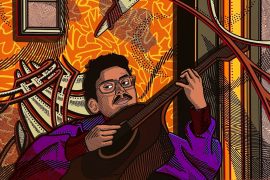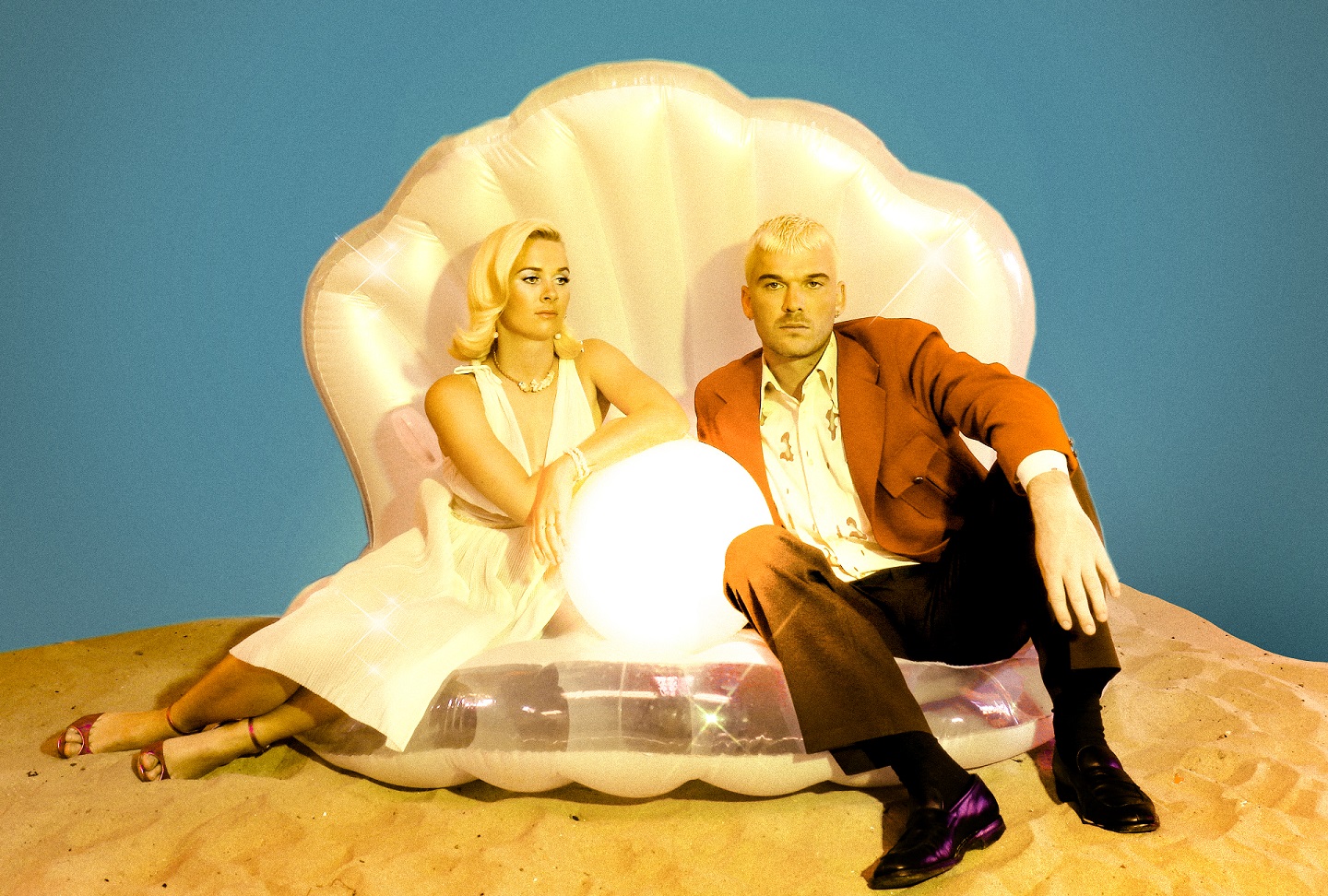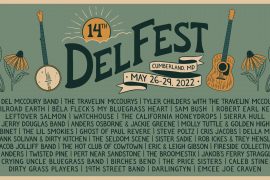A cinematic record seemingly balancing life on a pin, Devin Sinha’s soaring fourth LP ‘Liminal Space’ is as intimate as it is grandiose, and as soft as it is dramatic: An album of transition, growth, and renewal.
Stream: “Lighthouse” – Devin Sinha
A cinematic record seemingly balancing life on a pin, Devin Sinha’s soaring fourth LP is as intimate as it is grandiose, and as soft as it is dramatic. A record of personal growth and change, the past, present, and future, Liminal Space is an elegant, glowing bastion of genre-bending folk rock full of energy, introspection, and hope: A somber recognition of faults and fracture, with the steadfast belief that time breeds self-improvement and betterment.

My greatest fear is knowing I might never love again
Each day that feeling seems further away
For all the lies I’ve told,
the broken hearts I stole
when I was lost alone inside my pain
And I know there’s a goodness in your best intentions
I know that you give me all your sincerest attentions
But I don’t know if you can sense my lonesome apprehension
and don’t love you
and I won’t be able to this time
I know how it sounds, I can hear it on my tongue
It’s not quite black and white as it may seem
I respect and I see you
Life is better when you’re here too
But I find myself alone inside my dreams
– “Greatest Fear,” Devin Sinha
Independently released on October 23, 2020, Liminal Space is a billowing, stunningly orchestrated triumph for Devin Sinha. Arriving three years after its predecessor Our Fathers Were Lions, the Seattle singer/songwriter’s fourth studio album further loosens the artist’s grip on the guitar, embracing a suite of stringed, brass, and woodwind instruments that breath fresh life into songs of self-reflection and discovery.
“Liminal Space refers to a period of transitions,” Sinha tells Atwood Magazine. “It’s that time and place between what was and what’s to come. I thought of the title early in 2020 while finishing the last tracks on the record, and thought it appropriate for this piece of work, as many of the songs feel like they are sitting in this space of remembering the past but not quite knowing what the future will bring. Little did I know at the time that soon we’d all be put on hold as the pandemic put a lot of plans on hold across the globe this year. While I haven’t been able to perform live since February, I’m looking forward to making my musical contribution through the album, and I hope people find some connection through it.”
Eloquent and vast, Liminal Space soars into existence through opener “Lighthouse,” a gorgeous tempest that sets a sweeping, urgent tone. The story of two partners separated by the sea offers an exciting fantasy, its push-and-pull narrative of desire and disconnect speaking to so many of us who have been stranded from loved ones this year – even if its writing and recording came long before “coronavirus” became a household term.
He’s a fisherman, spending months away, tending to the sea
His hands are coarse from ropes and waves that beat back violently
When the tide subsides and brings him to her harbor once again
She feels adrift seeing the light behind his eyes is growing dim
She says sail back out to sea
or stay, just stay with me
and I will be your lighthouse, seek shelter in me
I will be your lighthouse, I will be your lighthouse
She keeps a log of all the traumas she’s had to endure
It’s getting so long now she wonders if it’s still worth keeping score
She asks him could he be the cure that she’s been looking for
He says broken can’t save broken, I can’t help you anymore
I can’t help you anymore
What’s perhaps most striking about Sinha’s artistry on Liminal Space is how readily the artist incorporates new sounds and textures into what was once a more traditional vocals-and-guitar approach. Sinha’s dabbling in orchestration was evident as early as his 2016 LP Our Past and Present Futures (look no further than the album’s opener to hear a wonderful use of cello in a folk context), but his latest release transcends all prior efforts.
“For this record, I spent many hours composing for violins, cello, trumpet, trombone, and other instruments, rather than solely relying on my engineers/producers/session musicians to help,” he says. “It was the first time that I had done so much composition outside of the instruments I play.”

This greater body of sound pays off in a big way across Liminal Space‘s nine songs, giving the artist an exciting assortment of backdrops upon which to indulge and introspect. The inner-facing “Ghost” and “Greatest Fear” are each elevated by delicate string arrangements that tastefully add to touching lyric-driven moments.
It also makes Sinha’s music that much more difficult to classify – and as many a listener can attest, that which defies expectation is often that much more mystifying, exhilarating, and exciting.
“I find musical inspiration across many genres, but I would say the music I tend to write falls somewhere between Americana, folk, and indie-rock,” Sinha says of his work. “I have never minded writing across genres. I’d rather think about what the song is trying to express, and find music to fit the music, rather than worrying if a song fits the mold of the type of work I’ve written before. I put a lot of care into my lyrics, so I think that tends to center me around the Americana and folk genre.”
While he makes a statement through sound, Sinha finds a strong voice through poetic lyrics that challenge his audience to think and feel. Every song brings us that much closer to the artist, as he himself embarks on a journey that knows no end.
I’ve been looking for help
I’ve been looking for fun
I’ve been looking to see where the next hit will be coming from
I’ve been looking for God
among the hometown fools
Got my back to the river but the fires are burning through
And if you see the sunlight tearing a scar in your room
and you hear the sirens call out, they’ve been looking for you
When the needle and thread that you keep in your head show the stitching is coming loose
there’s a place where the faces of friends and lost loves can be found, still smiling at you
Come back, boy, come back to the living
There’s a crack in the wall
There’s a hole in the door
There’s a look on my mother’s face I’ve never seen before
It’s a shot in the dark
It’s a homecoming scene
There are lies that we tell in the night just to hold back the screams
We had dreams that our earthbound souls could fly
with our hearts on the ground but our eyes to the sky
But the devil creeps quiet, sneaking up from behind…
We let him in
– “Come Back To The Living,” Devin Sinha
“I am excited about this record for so many reasons!” Sinha says. “I always look for growth with each album I release, and this album set a new high point for me in terms of lyricism and composition. I hope audiences that are discovering it for the first time or people who have followed my previous work will feel the attention to detail in this record and the authenticity I tried to convey in each song. It’s also exciting just to be able to share new music at all, as performances have been shut down in my home base of Seattle for most of the year, with no signs of opening again soon. Just having the ability to get new music to people who may be missing it this year is thrilling, even if I can’t release it the way I thought I would with a slate of upcoming shows.”
While our bodies are by and large grounded for the time being, our spirits can still soar.
Liminal Space is an invitation to let go of ourselves for a brief minute, and slip on something more comfortable: To relax into the thrill of the unknown and dwell in charming sonic depths. By the time “If You Can” signals this soundtrack’s end, you’ll be ready to start it all over again.
Experience the full record via our exclusive stream, and peek inside Devin Sinha’s Liminal Space with Atwood Magazine as the singer/songwriter goes track-by-track through the music and lyrics of his fourth studio album!
— —
:: stream/purchase Liminal Space here ::
Stream: ‘Liminal Space’ – Devin Sinha
:: Inside Liminal Space ::

— —
Lighthouse
Lighthouse is a song I began writing while traveling abroad in 2018 in Indonesia. I remember traveling across the country in the backseat of a car, looking out at the water and began imagining a narrative between two people, one of whom was always out on the water while the other waited at shore. I started thinking about what that kind of relationship would be like, using the water itself and the rolling tide as a metaphor for the changes in the lives. I didn’t finish the song until much later when I’d returned to the States, but I kept the words (as I do with many of my songs) in a digital note taking app on my phone to let the first drafts sit before I could get home and really work and revise them more. When it came time to arrange this song for the record, I worked with my friend Andrew Joslyn, who is a professional composer, to help arrange the orchestral piece. Our goal was to keep the song intimate and personal while capturing a cinematic feeling, and I loved how this turned out so much that I decided to make it the opening track.
Come Back to the Living
The origins of this song date back to the November of 2017 when I was spending some time in Sydney, Australia. I had come down with a very bad cold on vacation, and was spending what should have been fun summer beach hours sick in bed, and decided to use my time stuck indoors to do some songwriting. There’s a line in the song about “sunlight tearing a scar in your room,” which came to me as the summer morning light was shining through the window, and the tone and ideas of the song sprang out of that line. It’s really a song about redemption and hope, and I think there’s a bit of spiritual inspiration from song The Wrestler by Bruce Springsteen.
Ghost
This song touches a bit on the relationship between art, the artist, and the audience. It’s one of a couple tunes I was working on around this time (there are some demos of songs in this vein that didn’t make the final cut) that touch on what it means to create art that you know will be seen and consumed by others, and how that act of creation or performance or sacrifice can be as draining as it is fulfilling. The narrator, or narrators, of the song are trying to understand if they still feel the meaning behind the art, or if only a ghost of that feeling remains.
Greatest Fear
Greatest Fear is arguably one of the most emotional songs on the record. I wanted to take the concept of a hard conversation of two people growing apart, and imagine what that would look like if you really took it to its extreme. Starting with the concept of “I don’t love you, and I won’t be able to” and building out, I think the song is intimate and heartfelt, with a protagonist who is not saying this in a way to be hurtful or dismissive, but with deep sadness that they can’t reach that depth of feeling.
Alone, At Last
This song might be the most surprising to some listeners who hear its origins, as at first blush it sounds like it may be another breakup song. However, I conceptualized this song when I was reading about a program that was searching for candidates who would be willing to give up life on Earth and be the first to voluntarily colonize Mars in a future space mission. These people would be leaving the only home we all share, on a one-way trip to an uncertain and difficult future in a completely alien environment. I was thinking about what type of person would be willing to take that risk and give up everyone and everything they know. Certainly there is an aspect of curiosity, exploration, and progress that might make this enticing, but at the cost of losing so much we take for granted here. The song was also my first written primarily for piano, which gives it a distinct feeling from my other works. For inspiration, I’d look to the song “The Commander Thinks Aloud” by The Long Winters.
Carry Me
This tune probably went through the most rewrites of any song on the record. With some songs, they come out naturally and barely go through any revision. This song did not fit that pattern at all, as I spent many hours writing and rewriting. I wanted to touch on the act of leaving and transitions, but originally wrote it from the perspective of the one left behind. I wrote the guitar and vocals simultaneously for this song, and both went through a lot of iterations and rewrites, though many of the individual images remained throughout the drafts. For instance, the song concept started with a line I’d written in my notes, “There’s beauty in the Midwest towns that time forgot to take,” and it was important to me that the line remain in some form in the piece. A lot of credit goes to some of my bandmates and friends in the Seattle music community who let me bounce my lyrics off them and didn’t let me off the hook when I was close to having the right words but could do better. In the end, this is one of the songs that I feel most personally rewarded to hear in its final form on the record, as it was a true labor that ended in a far better place than where it started.
Beneath The Stars
This song gets back to some of my Americana/Country roots, and was so fun to compose. For this tune, I was looking for something I knew would be fun to perform live and could get an audience involved in, so I started the song thinking about chord progressions and the “woahs” rather than focusing on lyrics first. As the song started to take shape, I composed a fun violin part that I wondered might sound OK on paper but be a mess when performed live. Going into the studio, our band’s violinist took a look at it and nailed it almost perfectly on the first try, and we knew we were onto something. This song always puts a smile on my face, and I can’t wait to perform it live when the world gets back to a place where we can safely play shows for everyone.
Come Back Home
Another song that makes me happy, Come Back Home gave me a chance to compose some trumpet and trombone lines. Before learning guitar, I spent eight years of my life playing Trumpet, so when I find a song that feels like it is a natural fit for brass, I love to take a swing at integrating that sound in to the music. I feel like Come Back Home draws on some of my musical inspiration from Josh Ritter, and felt like a great track to flow into from Beneath the Stars.
If You Can
The closing song of the record, If You Can strips the instrumentation to a minimum of one guitar and violin, with my vocal acting as a through-line. My producer and I wanted this song to feel intimate, as if you could imagine the song being performed live in front of the listener. As grand as some of the songs on the album are, I wanted to end in an intimate space, and this song fits that in both instrumentation lyrics, as a humble ask for forgiveness at the end of a journey between two people. Hopefully the listener’s journey with the record will leave them with strong emotions, though I hope I don’t have to ask forgiveness after they’ve taken this journey with me!
— —
:: stream/purchase Liminal Space here ::
— — — —

Connect to Devin Sinha on
Facebook, Twitter, Instagram
Discover new music on Atwood Magazine
? © Vera Pashkevich
:: Stream Devin Sinha ::








